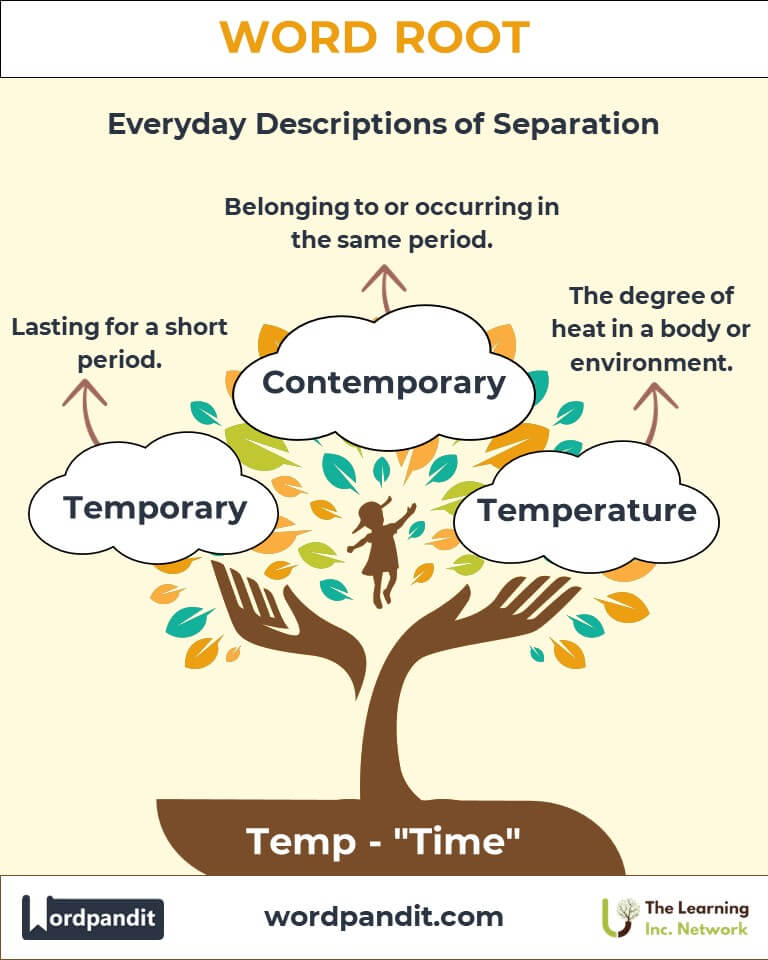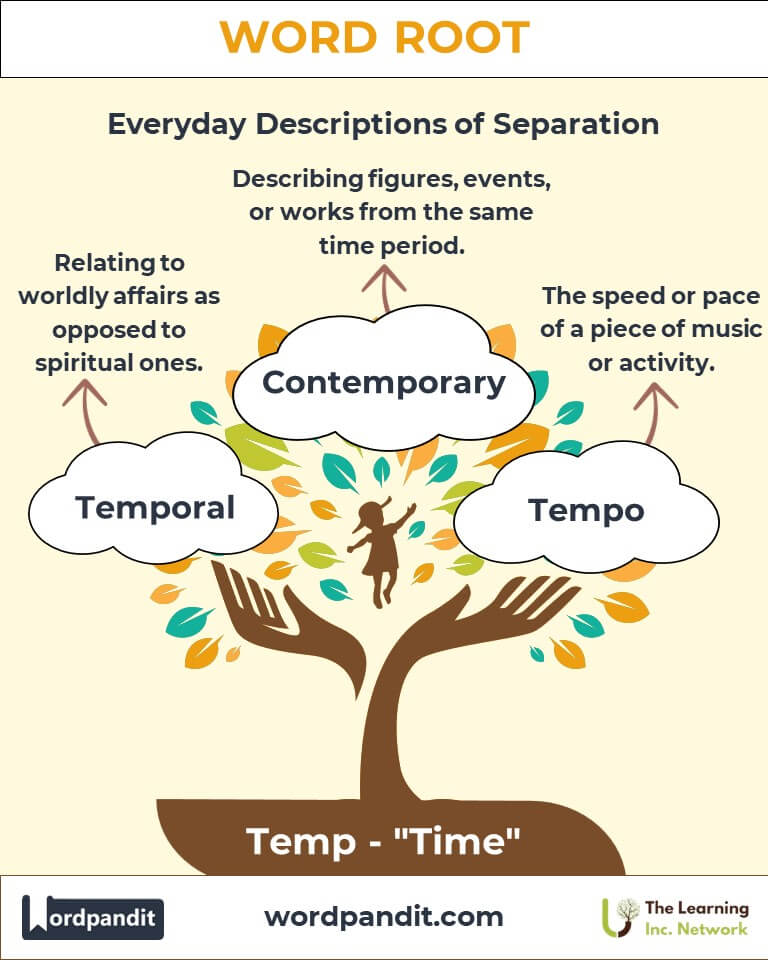Temp: The Root of Time in Language and Life
Byline: Discover the linguistic and cultural significance of the root "temp," derived from the Latin word for time. This root flows seamlessly through words like "temporary" and "contemporary," encapsulating the essence of fleeting moments and shared eras.

Table of Contents
- Introduction: The Essence of Temp
- Etymology and Historical Journey
- Mnemonic: Unlocking the Power of Temp
- Common Temp-Related Terms
- Temp Through Time
- Temp in Specialized Fields
- Illustrative Story: Temp in Action
- Cultural Significance of Temp
- The Temp Family Tree
- FAQs About the Temp Word Root
- Test Your Knowledge: Temp Word Root Quiz
- Conclusion: The Living Legacy of Temp
1. Introduction: The Essence of Temp
What does time mean to you? The root "temp", originating from Latin, captures the transient nature of moments, whether fleeting or eternal. Found in words like temporary (lasting for a short time) and contemporary (belonging to the same time), it embodies humanity's perpetual relationship with time's passage. From everyday conversations to philosophical discourses, "temp" offers insights into how we understand and measure time.
Pronunciation: "temp" (as it sounds in "temper").

2. Etymology and Historical Journey
The root "temp" stems from the Latin word "tempus," meaning "time." Its use dates back to Ancient Rome, where time was seen not just as a measurement but as an integral part of life's rhythm. During the Middle Ages, "temp" found its way into Romance and Germanic languages, appearing in words that spoke of temporal existence, shared eras, and seasonal cycles.
3. Mnemonic: Unlocking the Power of Temp
To remember "temp," picture a sand-filled hourglass with grains slipping through—a visual representation of time's fleeting nature.
Mnemonic Device: "Temp is the tempo of time, ticking away moment by moment."
4. Common Temp-Related Terms
- Temporary (TEM-puh-rair-ee):
- Definition: Lasting for a short period.
- Example: "The company hired temporary workers for the holiday season."
- Contemporary (kuhn-TEM-puh-rair-ee):
- Definition: Belonging to or occurring in the same period.
- Example: "The contemporary artists held a joint exhibition."
- Temperature (TEM-puh-ruh-chur):
- Definition: The degree of heat in a body or environment.
- Example: "The rising temperature signaled the arrival of summer."
- Temporal (TEM-puh-ruhl):
- Definition: Relating to worldly affairs as opposed to spiritual ones.
- Example: "The debate highlighted the temporal concerns of the citizens."
- Tempo (TEM-poh):
- Definition: The speed or pace of a piece of music or activity.
- Example: "The tempo of the song gradually increased, energizing the crowd."
5. Temp Through Time
- Medieval Latin: Introduced "temporalis" (worldly or transient), leading to words like temporal.
- Modern English: Expanded into terms like "temperature," connecting time with natural changes.
6. Temp in Specialized Fields
- Music:
- Tempo: Dictates the speed of musical compositions, from allegro to adagio.
- Meteorology:
- Temperature: Reflects time-sensitive changes in climate and weather patterns.
- History:
- Contemporary: Describes figures, events, or works from the same time period.
- Philosophy:
- Temporal: Explores the nature of time and its intersection with existence.
7. Illustrative Story: Temp in Action
In a bustling city, a young musician named Clara struggled to find the perfect tempo for her symphony. Inspired by a fleeting sunset—a temporary moment of beauty—she crafted a melody that captured the essence of time's fleeting nature. Meanwhile, her historian friend analyzed the works of contemporary artists to understand how time shaped their perspectives. Their shared passion for "temp" reminded them that whether in music or history, time leaves its mark on everything.
8. Cultural Significance of Temp
The root "temp" holds profound cultural resonance. In literature, it explores the fleeting nature of life, as in the Shakespearean phrase, "O, how full of briers is this working-day world!" In music, it sets the rhythm of compositions. Across languages and cultures, "temp" reminds us of the universal experience of time's passage.

9. The Temp Family Tree
- Chrono- (Greek: "time"):
- Chronology: The study of time sequences.
- Chronic: Persisting over time.
- Thermo- (Greek: "heat"):
- Thermometer: A device measuring temperature.
- Thermodynamics: The science of heat and energy.
- -ary (Latin suffix):
- Temporary: Lasting for a short time.
- Sanctuary: A place of refuge.

10. FAQs About " Temp "
Q: What does the root "temp" mean?
A: The root "temp" means "time." It comes from the Latin word tempus, which refers to time in its many forms—whether fleeting, cyclical, or shared. Words derived from this root often relate to the duration, rhythm, or era of events.
Q: How does "temporary" differ from "contemporary"?
A: Temporary refers to something lasting for a short or limited period, like a temporary job. Contemporary refers to things or people existing or occurring in the same time period, such as contemporary art or Shakespeare’s contemporaries.
Q: What is the meaning of "temporal"?
A: The word "temporal" relates to worldly or time-bound matters as opposed to spiritual or eternal ones. For example, "temporal concerns" focus on immediate, earthly issues like finances or daily routines, contrasting with eternal concerns like the afterlife or spiritual growth.
Q: Why does "temperature" relate to "temp"?
A: "Temperature" measures the degree of heat or cold over time. The connection lies in how temperature changes are often observed and recorded over specific periods, making "temp" integral to understanding environmental and physical conditions.
Q: How is "tempo" used in music?
A: "Tempo" refers to the speed or pace at which a piece of music is played. It gives structure to time in music, dictating whether a composition feels fast, slow, or steady. For example, a "lively tempo" creates excitement, while a "slow tempo" evokes calmness.
11. Test Your Knowledge: " Temp " Mastery Quiz
1. What does the root "temp" signify?
2. What does "temporary" mean?
3. What is "tempo" in music?
4. How does "contemporary" relate to time?
5. Which field uses "temperature" as a key concept?
12. Conclusion: The Living Legacy of Temp
The root "temp" is a timeless testament to humanity's relationship with time. From fleeting moments to shared eras, it resonates across disciplines and cultures. As we continue to measure, analyze, and reflect on time, "temp" will remain a vital thread in the fabric of language and thought. Let it inspire you to cherish every moment and explore the rhythms of life.














